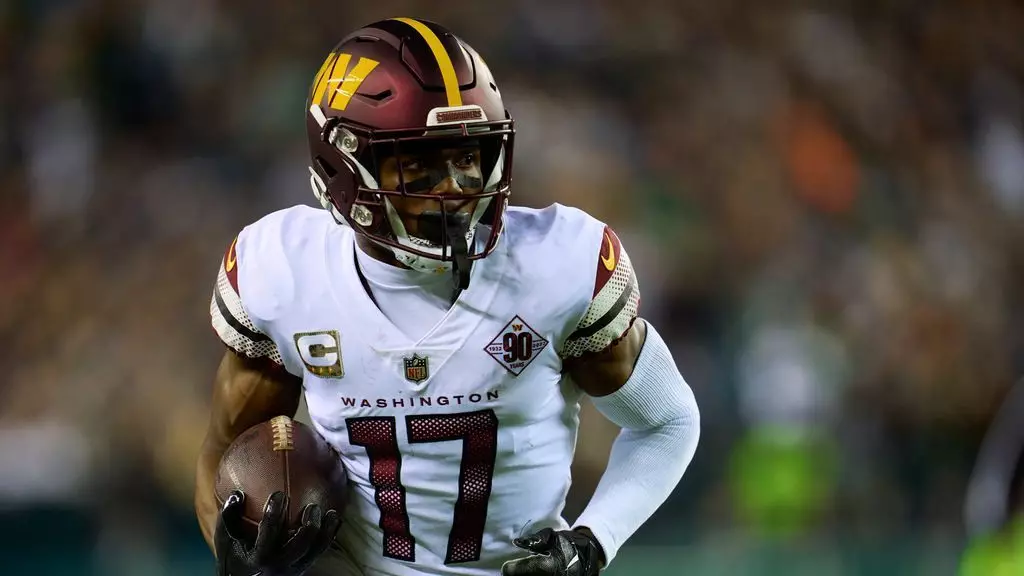In the high-stakes world of professional football, personalities, contracts, and performances collide, often creating friction that tests loyalty and ambition. Recent developments surrounding Washington Commanders’ star wide receiver Terry McLaurin exemplify this clash. While many view a trade request as a sign of discord, it can also be understood as a manifestation of a broader systemic issue: the relentless pursuit of fair recognition and worth in an industry that often undervalues its most dedicated athletes.
McLaurin’s decision to request a trade underscores a critical aspect of player-agent-management dynamics. Despite his contributions—five consecutive seasons surpassing 1,000 yards and two Pro Bowls—his contract negotiations have failed to keep pace with the market. Washington’s reluctance to offer top-tier compensation to a receiver approaching 30 reveals a shortsighted approach that undervalues reliability and consistency. From a moral perspective, it questions whether teams truly prioritize player loyalty or if they perceive athletes merely as interchangeable assets.
The NFL’s landscape makes it clear that players are no longer passive participants. While coaches like Dan Quinn might downplay the situation as “normal business,” it’s essential to recognize how such negotiations reflect a deeper imbalance of power. McLaurin’s case highlights how players, despite being central to team success, often find themselves negotiating against an industry that prizes future potential over proven worth. The disconnect illustrates a fundamental truth: talent and dedication, even when proven, can be sidelined in favor of monetary calculus.
The Rhetoric of Business as a Shield for Player Dissatisfaction
Coaches and executives often resort to framing contract disputes as “business,” aiming to diminish the personal dissatisfaction players might feel. Quinn’s comments, suggesting that McLaurin’s trade request isn’t a distraction, operate as a tactical narrative designed to preserve team harmony. But beneath the surface, it’s evident that this “business as usual” commentary masks a critical tension: players seeking fair valuation are systematically marginalized as commodities rather than individuals worthy of respect.
This rhetoric, however, risks trivializing the emotional and career implications for athletes like McLaurin. It dismisses the personal stakes involved in such negotiations—professional validation, financial security, and respect. It’s particularly problematic given that McLaurin ranks among the league’s top receivers; his consistent performance indicates that the team’s valuation does not match his contributions on the field. The language used to describe these conflicts shapes public perception but can also obscure the genuine dissatisfaction that fuels such trade requests.
In a league that champions spectacle and storytelling, it’s crucial to reflect on the ethical boundaries of framing athletes as mere chess pieces. The narrative should evolve from “business as usual” to a recognition of athletes’ humanity. Their pursuit of equitable compensation isn’t just about money—it’s about dignity and acknowledgment of their true worth.
The Unseen Costs of Neglecting Player Contributions
The negotiation stalemate between McLaurin and Washington exposes a broader neglect of the importance of player market value. The club’s hesitance to pay a veteran receiver top dollar stems from a fixation on age as a limiting factor, failing to appreciate the modern NFL’s trend of valuing skill, consistency, and leadership—irrespective of age.
This myopic view overlooks the cost of undervaluing talent. Teams that fail to recognize the true worth of their star players risk destabilizing locker rooms, losing fan support, and impairing on-field performance. McLaurin’s case is emblematic; he is not just a statistical contributor but a locker-room leader and fan favorite who has elevated Washington’s offense. Ignoring such influence for short-term financial prudence can lead organizations into a cycle of losing star players, which ultimately damages their brand and competitive edge.
Furthermore, the disparity between McLaurin and younger stars like DK Metcalf reveals a deeper institutional attitude—one that diminishes the importance of experience while overestimating potential. The NFL’s obsession with youth may erode long-term stability, undervaluing players who have demonstrated their skill and resilience season after season. This shortsightedness imperils the league’s integrity, forcing athletes to fight harder just to be recognized and compensated fairly.
The Human Cost of a Business-First Approach
While the NFL’s business machinery continues to churn, athletes like McLaurin grapple with the emotional toll of feeling undervalued. His reported injury rehab, autographs for fans, and attendance at meetings underscore his dedication despite ongoing frustrations. Such scenes reveal a man committed to his craft, yet one whose future stability remains uncertain due to contractual negotiations rooted in financial disagreements.
This ongoing tension exposes a systemic issue: the failure to view athletes beyond their on-field output. Their physical and mental well-being, their aspirations, and their sense of worth often take a backseat to negotiations driven by spreadsheets and market analytics. McLaurin’s story isn’t just about a trade request; it is about athletes fighting for rightful recognition in a league that, paradoxically, preaches loyalty while prioritizing profitability over players’ loyalty to their craft.
Furthermore, the emotional strain inflicted by such disputes can erode trust within organizations. McLaurin’s visible respect for the coaching staff and his willingness to stay engaged despite frustrations reflect a professionalism that should be reciprocated. The league must confront whether its transactional approach ultimately serves the sport’s best interest or diminishes its integrity.
McLaurin’s predicament is a mirror held up to the NFL’s broader systemic mentality—where talent, dedication, and experience are often undervalued in favor of short-term financial strategies. Recognizing and rewarding players for their true worth isn’t just a matter of fairness; it’s essential for the league’s long-term vitality and credibility. The sport’s future depends on evolving beyond a narrow focus on revenue and embracing a holistic respect for its most valuable assets—its athletes.

